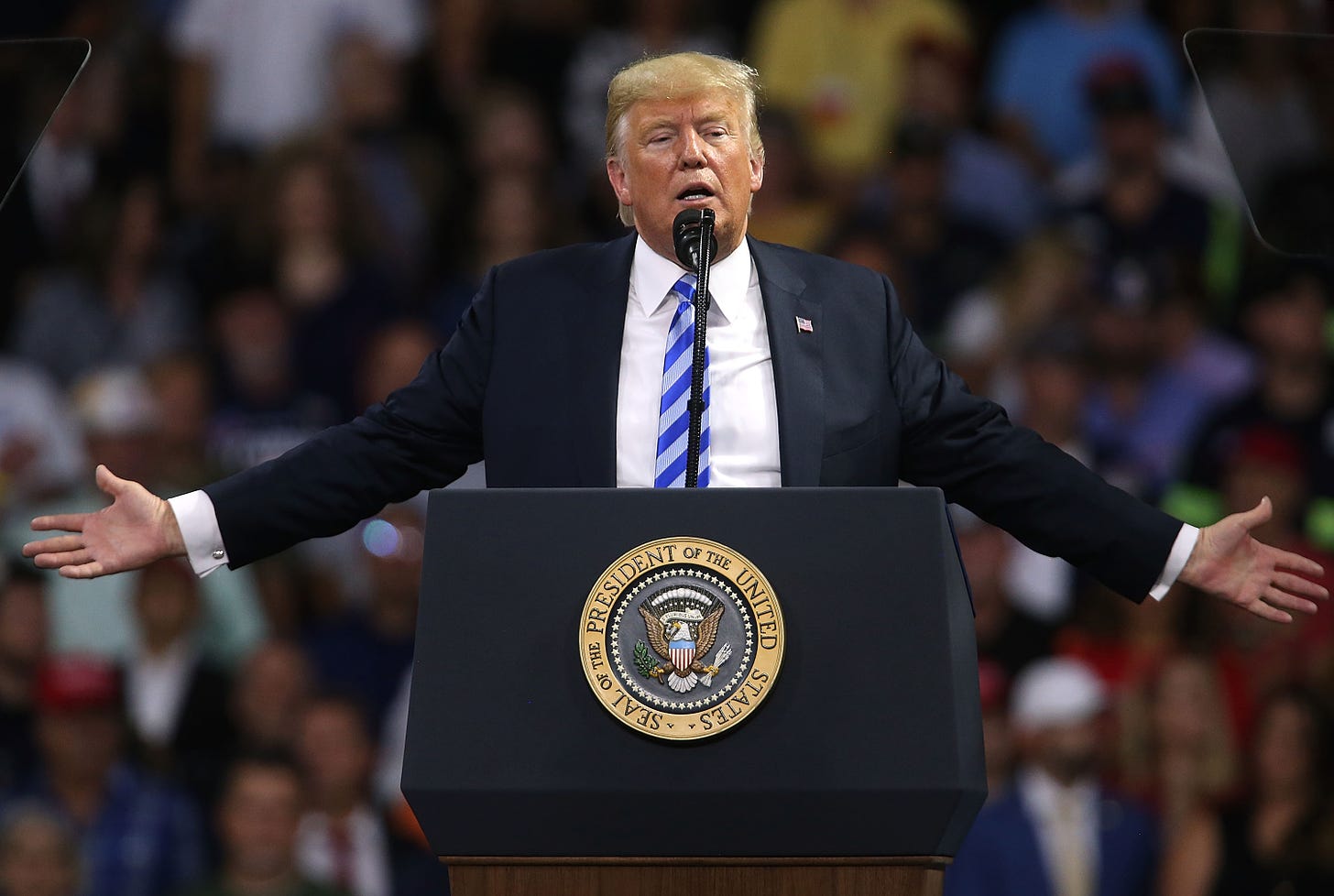
(Trump speaks at a rally on August 21, 2018 in Charleston, West Virginia. Photo by Spencer Platt, via Getty Images.)
On Monday night The New York Times released a bombshell after obtaining more than two decades of Donald Trump’s tax information that revealed what many had suspected — a compromised financial predicament that hinged on the need to promote a brand, under the guise of serving the public. Trump’s records confirm that his properties are not as lucrative and vast as he claims, and he has gamed the tax system by using massive write-offs.
His financials also reveal a portfolio that includes hundreds of millions of dollars in debt that would have been hard for Trump to access without the backing of someone else, and those loans are set to come due during the next few years — right in the middle of a hypothetical second term as president.
The article also explains that Trump is still embroiled in a decade-long audit battle with the Internal Revenue Service over an enormous refund that Trump received by emphasizing millions in losses, that may or may not be legitimate. Think back to that moment in February of 2019 when Micheal Cohen explained Trump’s system of fraud during his testimony before Congress.
Cohen described Trump’s method of exaggerating his personal wealth repeatedly in financial documents that he provided to banks and insurers. Cohen told Alexandria Ocasio-Cortez (D-NY) that Trump submitted “inflated” assets to insurance companies at times and in other instances, Trump has down played the value of his golf courses to local tax officials, in an effort to get tax breaks. Cohen testified that Trump was “a con man.”
Cohen also testified that Trump had showed him a huge check from the US Treasury some years earlier and said “that [Trump] could not believe how stupid the government was for giving someone like him that much money back.” Cohen was referring to the refund Trump received in 2010 after claiming an income tax refund totaling $72.9 million, which included all of the federal income tax he had paid for 2005 through 2008, plus interest.
This huge IRS payment to Trump is the subject of the IRS audit on Trump and his taxes. Business losses can be used as a tax-avoidance coupon to offset taxable income from elsewhere. Some losses can be saved for later use, or even used to request a refund on taxes paid in a prior year. Those coupons were limited, and could only be used to wipe away taxes going back two years, until the law was changed in 2009.
A new provision in a bill signed by President Obama, as part of the Great Recession recovery effort, made it possible for Trump to seek a refund of $13.3 million he had paid in 2007. This was in addition to the combined $56.9 million he paid in 2005 and 2006, after “The Apprentice” yielded unusually substantial income for him. According to The New York Times article: “His total federal income tax refund would eventually grow to $70.1 million, plus $2,733,184 in interest. He also received $21.2 million in state and local refunds, which often piggyback on federal filings.”

(Trump looks over the shoulder of Treasury Secretary Steven Mnuchin as he is sworn in during a ceremony at the White House on February 13, 2017. Mnuchin, a staunch Trump loyalist who has worked diligently to conceal all of Trump’s financials, has often taken the fall for unfavorable policies at the US Department of Treasury for the Trump administration. Photo by Rex Features, via AP Images.)
If the auditors retroactively reject Trump’s $72.9 million federal refund from 2009, he will be forced to return all the money with interest, and possibly penalties. That total could exceed well over $100 million. He could also be ordered to repay the state and local refunds based on the same federal ruling, which would mean he owes millions more in future payments.
After Trump’s success with “The Apprentice,” he went on a buying spree thanks to his new access to solid income — a switch-up from his usual routine. Trump used this infusion and likely the subsequent refund to buy 15 golf courses and to transform the Old Post Office building in Washington into the Trump International Hotel.
None of these businesses turn a profit according to the financials obtained, and he uses their substantial losses to continue to get more tax breaks. In 2012, he took out a $100 million mortgage on the commercial space in Trump Tower and used almost the entire amount as a cash payout, according to tax records. His company has paid more than $15 million in interest on the loan, but nothing on the principal and the full $100 million comes due in 2022.
Trump is personally responsible for loans and other debts totaling $421 million, and payments are set to resume on most of it within the next four years. His financial disclosure released in July of this year showed that he had as little as $873,000 in securities left to sell. Additionally, Trump’s businesses reported cash on hand of $34.7 million in 2018, down 40 percent from five years earlier. An unfavorable ruling for Trump by the IRS, which would attach an immediate debt of over $100 million plus penalties, would mean that he would owe on a huge sum that he can’t readily pay. That sum would continue to accrue interest and more penalties would attach. Most importantly, payments to the IRS cannot be discharged in bankruptcy court.
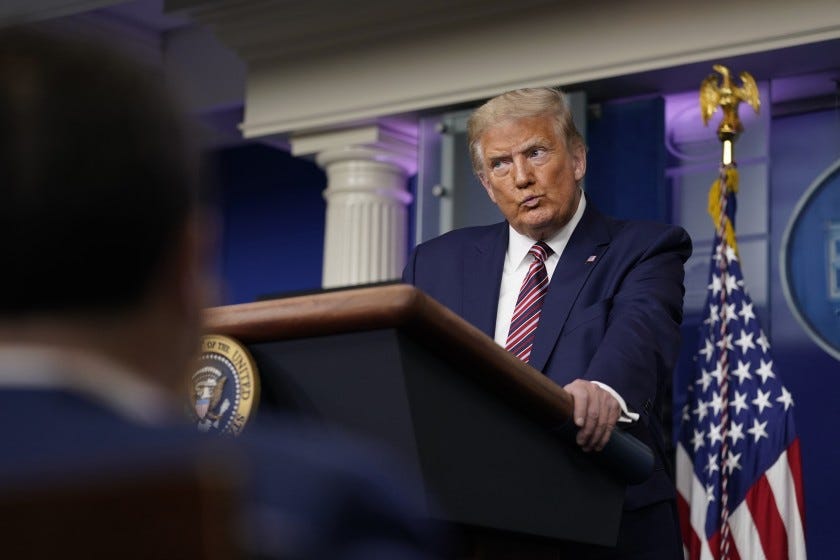
(Trump pauses during a news conference at the White House on Sept 27, 2020, the same day that the article on his financial status, that included previously undisclosed figures, by The New York Times was released. Photo by Carolyn Kaster, via Associated Press.)
This latest treasure trove of Trump financial documents has not only given us access to dealings that Trump has worked feverishly to keep secret all these years, it also forces us to re-examine previous reports of whistleblower complaints that may have been overlooked due to the timing of their release. In the fall of 2019, an Internal Revenue Service official filed a whistleblower complaint reporting that he was told that at least one Treasury Department political appointee attempted to improperly interfere with the annual audit of the president’s tax returns.
The details of the IRS complaint followed the announcement of a separate, more explosive whistleblower complaint filed in August 2019 by a member of the intelligence community about Trump’s quid pro quo with Ukraine that ultimately led to Trump’s Impeachment. The IRS whistleblower complaint was clearly overshadowed by the intel whistleblower complaint and at the time, we did not have access to Trump’s taxes, which prove how desperate he is to prevail in the IRS audit.

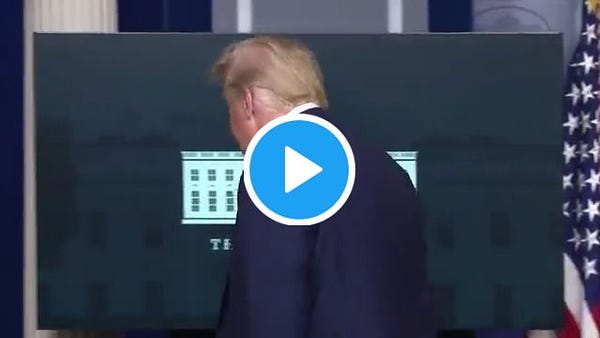
With all of the information now at our disposal, including first hand, reliable testimony about Trump’s business practices and personal financial habits, the picture suddenly starts to come into focus. The process of how the IRS conducts its annual and subsequent audits of the president’s and vice president’s tax returns is a process that is supposed to be secure and protected from undue interference or influence from political appointees. If the details of the whistleblower complaint are accurate, this has not been the case.
“Two administration officials have described the IRS complaint as hearsay and suggested it was politically motivated, but they spoke on the condition of anonymity because of the sensitivity of the matter. Democrats who have reviewed it regard it as a deeply significant allegation that, if true, suggests that political appointees may have tried to interfere with the government audit process, which was set up to be insulated from political pressures.” -Washington Post excerpt on the story
The whistleblower complaint was only first disclosed in a mid-2019 lawsuit by Rep. Richard E. Neal (D-MA), the chairman of the House Ways and Means Committee, that was filed against the Trump administration seeking six years of the president’s tax returns. Neal had received the whistleblower complaint in July 2019 and explained in the court filings that would follow that the complaint contains credible evidence of “potential ‘inappropriate efforts to influence’ the mandatory audit program,” saying the complaint raises “serious and urgent concerns.”
A court filing from that suit initiated by Neal revealed some allegations contained in the whistleblower complaint, specifically that there was interference in the audit process made by at least one Treasury Department official. The complaint also revealed that the whistleblower was a career IRS official.
Legal experts and former IRS officials also confirm that it is very unusual for political appointees at Treasury to ask IRS career staff about the status of an individual’s audit. Given this premise, an inquiry into the status of the President of the United States’ audit would seem even more remarkable. In light of this recent New York Times article, and the subsequent documents that reveal Trump’s tax records for the last few decades, it’s critical that the allegations in the whistleblower complaint be made public or, at the very least the public needs to be updated on the status of any investigation.
Amee Vanderpool writes the SHERO Newsletter and is an attorney, published author, contributor to newspapers and magazines and analyst for BBC radio. She can be reached at avanderpool@gmail.com or follow her on Twitter @girlsreallyrule.
Your paid subscriptions allow me to keep publishing critical and informative work that is often made available to the public — thank you. If you like this piece and you want to further support independent journalism, you can forward this article to others, get a paid subscription if you don’t already have one or send a gift subscription to someone else today.





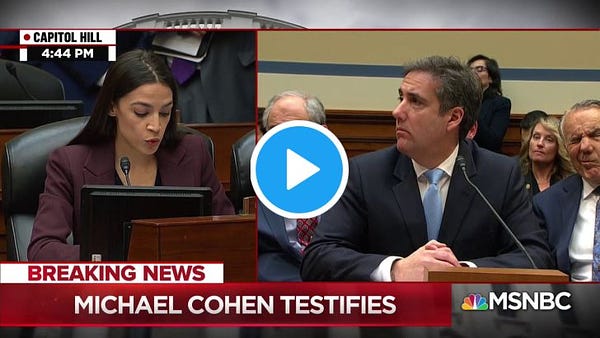

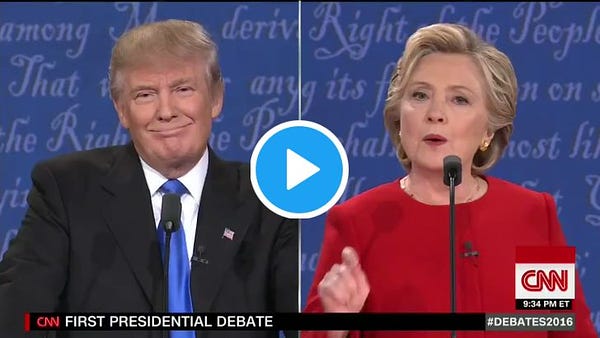
The most disheartening things about these revelations is that A) No one at all is really surprised by them, and B) His brainwashed, cultist supporters are completely ignoring this, or calling it "fake news", or claiming that if anything, it shows what a "genius businessman" he really is.
I'd like to see Biden push that knife under his ribs, so to speak, several times tonight. I'm going to be honest and say that I don't know that I can watch more than a minute or two; I don't want to see him stalking Biden, breaking all the debate rules, and performing the way he always does and getting away with it. If that happens, I'd like Biden to say, "If the president doesn't plan to actually debate, I'm done." and walk off, but I know that would be do this detriment. Good luck to everyone who can watch what I expect to be a three-ring spectacle of the absurd tonight.